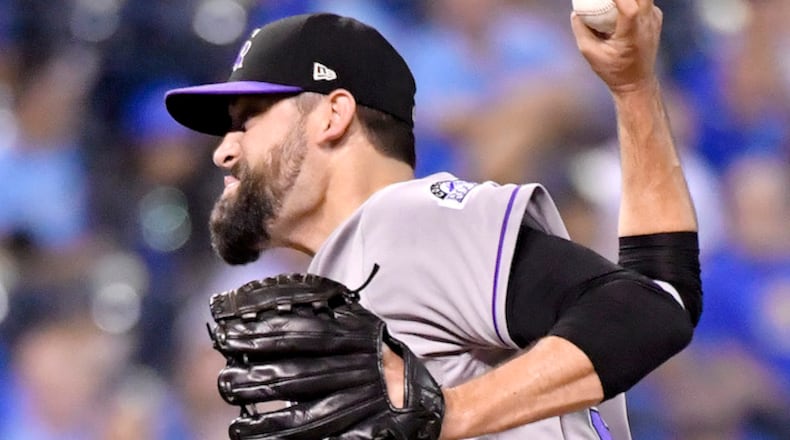Pat Neshek is 37 years old. He's 10 years removed from elbow surgery, and his right arm has survived the last eight seasons. He has pitched for seven teams and made the playoffs five times, but he still lacks the World Series ring that would be the cherry on top of a fine career.
So, when he decided last December to re-sign with a Phillies team that lost 96 games last season, many of his fans on Twitter and even some friends and family were confounded, to put it mildly.
"People were like, 'Why did you sign there? Are you an idiot? What the ... ?' " Neshek said, emphasizing the last two words for effect. "But I just liked how things were going."
Indeed, Neshek had insider information. He spent the first four months of last season with the Phillies before getting dealt to the Colorado Rockies at the trade deadline. And what he saw firsthand, coupled with how many of the Phillies' young players performed last August and September, reminded Neshek of one of his former teams, a club that might as well be the model for all rebuilding franchises that have followed.
The Houston Astros lost 106, 107, 111 and 92 games in the four years that preceded Neshek signing a two-year contract before the 2015 season. Nobody expected much from the Astros in 2015. But center fielder George Springer blossomed in his first full year in the majors, shortstop Carlos Correa made an immediate impact upon getting called up in midseason, Dallas Keuchel went from largely unknown to winning the Cy Young Award and Jose Altuve established himself as an elite hitter. The Astros went 86-76, clinched a wild-card spot and advanced to Game 5 of the division series.
It was the birth of a contender, the prelude to a World Series championship three years later. And from Neshek's seat in the bullpen, it all looks familiar to what the Phillies have done en route to spending the past month in first place in the National League East.
"I kind of went through this with the Astros in 2015," Neshek said, reflecting the other day on the Phillies' progress. "They had a good, young core. They had the resources to add free agents during the time I was there. It feels real similar to that. I think we're actually ahead of where the Astros were in '15. I think we're in a lot better place."
Neshek admits he "didn't have a clue" about which of the Phillies' young hitters would emerge. His clairvoyance about the team's chances stemmed more from his belief in the potential of a young starting rotation. Aaron Nola's 3.00 ERA over his final 18 starts last season gave him the look of an ace-in-the-making. Vince Velasquez, Nick Pivetta, Jerad Eickhoff and Zach Eflin all had their moments, inconsistent as they were, to make Neshek think they could be reliable.
"I thought, if you could get those guys to step up," Neshek said. "And god, they've stepped up."
Nola has had a Keuchel-style breakthrough, putting himself in the early Cy Young conversation. Velasquez, Pivetta and Eflin have all taken steps forward, and the Phillies have the fourth-best ERA (3.70) among NL starting rotations.
But there's another similarity — the most meaningful one, according to Neshek — between the 2018 Phillies and the 2015 Astros. That Astros club was led by first-year manager A.J. Hinch, who changed the culture in the clubhouse by creating what Neshek described as "an environment where guys can thrive." Neshek said Phillies rookie manager Gabe Kapler has done the same with his relentless positivity and more nurturing style than his old-fashioned predecessor Pete Mackanin.
"Last year, there wasn't a good environment here for the young guys. It was a scary environment," Neshek said. "It was kind of sink or swim or you're getting sent back down. I know it's kind of how the big leagues used to be. But it's not fun. And I think a lot of front offices are sort of seeing that with a lot of hires that are younger managers now to get that (more supportive) environment."
The Phillies have the majors' youngest roster, with many players who are developing at the highest level. Kapler has fostered a culture where players can make mistakes and grow from them. Third baseman Maikel Franco, right fielder Nick Williams and Velasquez are examples of young players who have gotten better from the beginning of the season until now.
By dropping a total of $169.25 million in free agency on Santana, right-hander Jake Arrieta, Neshek and fellow reliever Tommy Hunter, the Phillies add veteran leaders. And they have helped create at atmosphere in which the Phillies party hard after wins with laser lights, a smoke machine and club music, and recover quickly from tough losses. They haven't dropped more than four games in a row and are 20-11 in one-run games and 7-5 in extra innings.
But Neshek credits the young players for carrying the Phillies back to relevancy. And with 48 games remaining, it will be the young players who most determine whether they will make the playoffs for the first time since 2011.
"I've been with some really good teams that were underdogs, and a key characteristic has been the young guys," Neshek said. "It's not something you always see in the big leagues where you see young guys having success. That's going to be really, really good for the future of Phillies baseball."
Just as it was for the Astros beginning in 2015.
About the Author
Keep Reading
The Latest
Featured


